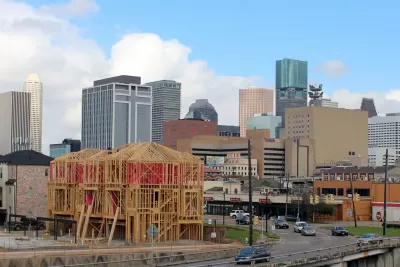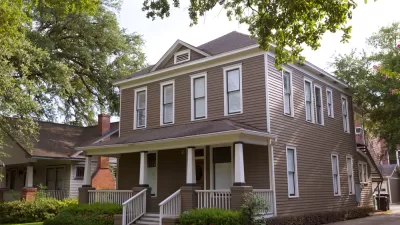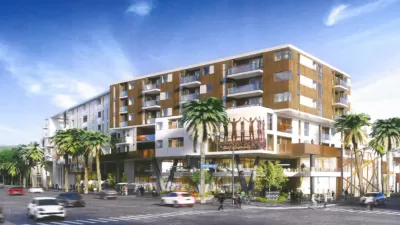A lawsuit argues that Houston's Historic Preservation Ordinance is a form of de facto land use control, equivalent to zoning, which isn't allowed by state and local laws.

Ryan Nickerson reports on a legal controversy that could decide the future of land use control in the U.S. city most famous for rejecting the most common form of land use controls.
A pair of local homeowners are attempting to make the legal case that the city of Houston's Historic Preservation Ordinance (HPO) constitutes a form of de facto zoning—a system of land use control that is ostensibly not allowed in the city.
"In a brief filed on behalf of Powell and Luccia on Sept. 8, Houston lawyer Matthew Festa said that Texas law does not support, 'a vague and unlimited power for local governments to regulate property rights without limitation,'" explains Nickerson.
Festa argues that the city's HPO "[limits] individual property rights to create restrictive historic zoning districts, ignoring the requirements set forth by the Texas Legislature and the people of Houston," according to the article.
Sara Bronin, Real Property Law professor at the University of Connecticut Law School and a land use reformer in the state of Connecticut, is quoted in the article saying that the legal argument presented by the plaintiffs is novel in the legal system. More on the history of the lawsuits against the HPO, and the history of the HPO, itself is included in the article.
FULL STORY: Heights homeowners take fight over preservation ordinance to state Supreme Court

Planetizen Federal Action Tracker
A weekly monitor of how Trump’s orders and actions are impacting planners and planning in America.

Restaurant Patios Were a Pandemic Win — Why Were They so Hard to Keep?
Social distancing requirements and changes in travel patterns prompted cities to pilot new uses for street and sidewalk space. Then it got complicated.

Map: Where Senate Republicans Want to Sell Your Public Lands
For public land advocates, the Senate Republicans’ proposal to sell millions of acres of public land in the West is “the biggest fight of their careers.”

Maui's Vacation Rental Debate Turns Ugly
Verbal attacks, misinformation campaigns and fistfights plague a high-stakes debate to convert thousands of vacation rentals into long-term housing.

San Francisco Suspends Traffic Calming Amidst Record Deaths
Citing “a challenging fiscal landscape,” the city will cease the program on the heels of 42 traffic deaths, including 24 pedestrians.

California Homeless Arrests, Citations Spike After Ruling
An investigation reveals that anti-homeless actions increased up to 500% after Grants Pass v. Johnson — even in cities claiming no policy change.
Urban Design for Planners 1: Software Tools
This six-course series explores essential urban design concepts using open source software and equips planners with the tools they need to participate fully in the urban design process.
Planning for Universal Design
Learn the tools for implementing Universal Design in planning regulations.
Heyer Gruel & Associates PA
JM Goldson LLC
Custer County Colorado
City of Camden Redevelopment Agency
City of Astoria
Transportation Research & Education Center (TREC) at Portland State University
Camden Redevelopment Agency
City of Claremont
Municipality of Princeton (NJ)





























